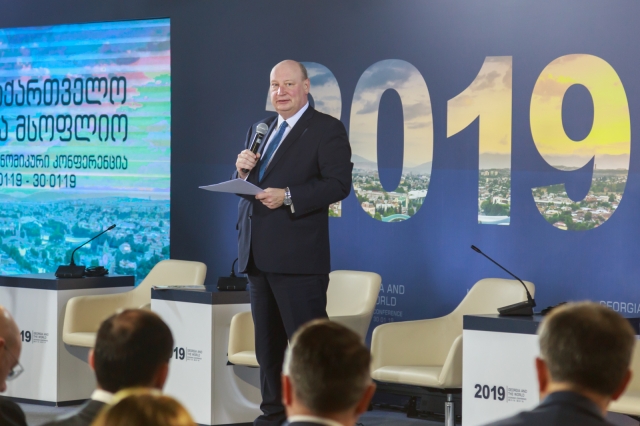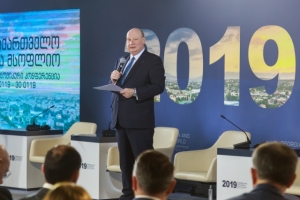Henrik Hololei on Georgia’s Transport & Economic Goals
EXCLUSIVE
Due to Georgia’s strategic location on the Silk Road, it has historically been one of the most important transport and trade routes in the world, connecting Europe and Asia. Transport was a key topic at the Economic Forum in Tbilisi from 29 to 30 January. The ability of Georgia to re-establish itself as an important transit hub is key to its economic development. We sat down with Henrik Hololei, the European Commission’s Director General for Mobility and Transport, to discuss how the EU is working together with Georgia to help them achieve the county’s transport and economic goals.
On transport and trade
The EU and Georgia have been working together on numerous projects to improve infrastructure and exploit Georgia’s advantageous geographical location. By developing its transport networks and potentially also opening processing centers, Georgia can benefit from adding value to its transport systems. However, as Hololei says, “in order to be able to get these goods, you have to have links that guarantee a seamless and smooth movement of goods. For that, there is a lot on the table and a lot to do.”
He notes that the Tbilisi-Kars railway as a game changer in the region and a very important trade route asset, but adds Georgia should not just develop its transport links on land, but also at sea. “There is no doubt that Georgia needs a deep-sea port. 75% of ships are unable to call at Georgia because of the current limitations. Georgia needs to re-establish itself in the Black Sea,” he says, “Black Sea trade is very important because that is the direct link to the European Union”. The EU recently pledged EUR 233 million in investment towards the construction of the Anaklia Deep Sea Port.
The development of the Trans-European transport network to Georgia and other Eastern Partnership countries will further facilitate easier trading between the EU and Georgia. In addition, the Transport Implementation Action Plan, developed in January, will continue to build on these corridors.
With the target of EUR 3.4 billion in consolidated investment, the EU has identified 18 priority projects both in Georgia and the EU. “That is creating predictability and clarity for potential investors by identifying the priorities,” says Hololei. “We very often understand what the problems are but not what the priorities are. Europe’s issue is how to better link the Eastern part of the EU to the West, because the transport networks there are not that intense. For Georgia, it is a question of how to use such a geographical location for the maximum benefit of the transport corridors.”
The European Commission recently decided to extend its Ten-T project to Georgia. “This is the backbone of European connectivity and the European infrastructure policy,” says Hololei. “Of course, the world doesn’t stop at the European borders.”
On aviation
At the Economic Forum, Hololei praised Georgia as being the leading aviation country in the Eastern Partnership. How has Georgia managed to become so successful? We asked him. “Georgia has dared to make bold decisions and it has also considered aviation as a strategic sector,” he replies. “Most importantly, it has opened itself up and said ‘we are keen to have more connectivity.’” Since the Georgia-EU aviation agreement was signed in 2010, as well as Wizz Air’s establishment in Georgia, traffic between the EU and Georgia has grown by more than 9% every year. Georgia benefited from joining the agreement early on. “Other Eastern Partnership countries that have signed or are in the process of signing this agreement, have done so much later. Georgia has had the first-move benefit.”
On pollution
Air pollution in Georgia, especially Tbilisi, has become a priority for the Georgian government. With transport being a major emitter of harmful substances, cleaner transport plays in an important role in becoming greener. “I’m very encouraged that in discussions with the Prime Minister as well as the Mayor of Tbilisi, they both underlined the need to modernize and ‘green’ the economy to make it more sustainable.” The government is looking at ways to replace the current fleet with cleaner cars. However, “it’s important to have the whole eco-system in mind,” says Hololei. “For example, roads should not just be new, but smart and sustainable, ‘smart’ meaning they embrace digitalization which is a tool to deal with pollution. They also have to include charging stations.”
In addition, by implementing a cleaner, more reliable and modernized metro system, as well as carsharing and pooling, the government hopes to incentivize people to leave their cars at home. Fewer cars on the road could also encourage people to cycle. “Here [Tbilisi], you hardly see anybody cycling and this is not a common view in most European cities,” says Hololei. “Many cities have already made a lot of effort and developed programs to incentivize people.” Yet he is positive about the government’s efforts for sustainable transport. “There needs to be a good understanding on both the city and government level. To me, it seems that the government level is definitely there, and I am sure that they will be working hard towards their environmental goals.”
On road safety
Road deaths in Georgia are on average 2.5 times higher than elsewhere in Georgia, although still lower than in most Asian countries. “The Prime Minister has underlined his very strong commitment to improving road safety and minimizing the number of people killed on the roads,” says Hololei. He goes on to discuss the three components upon which road safety is built. Firstly, infrastructure must be safe, with, for example, roads displaying the correct signs and markings. Secondly, vehicles must be in a safe condition. The introduction of mandatory vehicle testing in Georgia is a step in the right direction, but Georgia still has many unsafe cars on the road. Finally, there is the human component. Road-users must change their driving behavior by not speeding or drink driving. Behavioral changes are the most challenging, Hololei notes.
From our discussion, it is clear that Georgia has huge potential to harness its geographical location and transport to grow its economy and improve the quality of life of its citizens. By overcoming challenges and creating a stable and predictable environment, Georgia could attract further investments for future infrastructure projects. “I see a strong commitment from the government and developers,” says Hololei. With EU support and further investment, Georgia should be able to create better, greener, and safer transport in Georgia, fully-benefit from its trade potential and become a transport hub for the region and beyond.
by Amy Jones
Image source: The Caucasus Business Week












